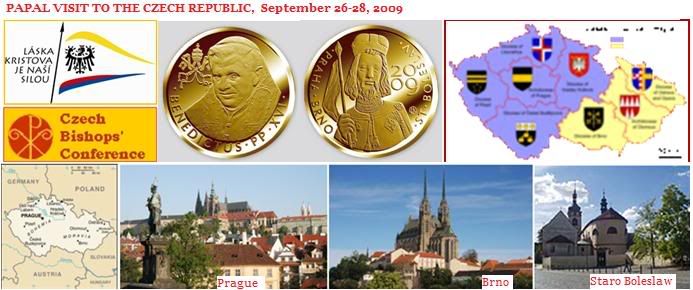 Posted earlier in the BENEDICT XVI NEWS thread.
Cardinal Spidlik says the Pope's visit
Posted earlier in the BENEDICT XVI NEWS thread.
Cardinal Spidlik says the Pope's visit
will help to unite Europe spiritually
Translated from
the Italian service of

Sept, 24, 2009
PRAGUE - Final preparations are being put into place in the Czech Republic for the visit of Pope Benedict XVI on September 26-28. He will be going to Prague, the capital; Brno, capital of Moravia; and Stara Bloleslaw, the site where the Czech patron saint Wenceslas was martyred.
His feast day on Sept. 28, the Czechs' National Day, is the occasion for the Pope's visit. Sergio Centofanti reports from Parague:
Prague is one of the most beautiful cities in the world. Serenely built, as Rome was, on the gentle slopes of seven hills, it is traversed by the sinuous Moldau River, which reflects the imahes of a parst that speaks to us of a Christian faith translated into Romanic, Gothic and baroque architecture. A pearl in the heart of Europe.
In these lands more than a thousand years ago, the brothers Cyril adn Methodius began their mission to lay down the first bridges between the Judaic-Greco-Latin world and that of the Slavs, inventing an alphabet for the Slavic languages so that the Slavs could read teh Gospel in their own languages.
The two brothers did not have an easy time of it, nor those who sought to emulate them. This is a land of martyrs. St. Wenceslas, who was killed because the Gospel does not favor teh interests of the powerful. St. Ludmilla, his grandmother, who was strangled to death simply because she gave her family Christian advice. St. Adalbert, pierced by a lance for preaching that Jesus was God made man. St. John Nepomuceno, who was drowned in the Moladau for refusing to reveal a secret of the confessional to the king. St. John Sarkander, who was tortured and killed because during the religious wars, he refused to be on any side but God's.
It is a land of pain and rebirth. In Brno, at the foretress prison of Spielberg, the Italian patriot Silvio Pellico, after eight years of suffering, rediscovered his faith and forgave his persecutors, and wrote the book "My Prisons", which was the first treatise on the rights of detained persons.
It is a land that has been vilated by two totalitarianisms, Nazism and Communism - both of which sold the illusory claim of building a world against God and without God.
Twenty years ago, the regime imposed by the Soviets fell, putting an end to the illusion that communism could rid mankind of all social adn economic cares.
And twenty years ago, John Paul II made his first of three visits here, and canonized Agnes, teh Bohemian princess who in the 13th century gave away all her goods to the poor so she could follow Christ's way of the Cross.
Mankind's anxieties have been well described by the great writer Franz Kafka, born in Prague, who lived during the late 19th and early 20th centuries. In his works (
Metamorphosis, The Trial, The Castle), man is overcome by a mysertious fate that he must expiate without knowing why. By an irresolvable evil that crushes life in the meanderings of a daily existence without sense.
John Paul II, in his three trips to this country, proclaimed the Truth which liberates man from this unsupportable weight and from teh violence that comes fron it. He announced the mercy of God. Which requires that man himself should forgive.
He asked forgiveness and offered forgiveness - for sufferings caused by the Church (he explicitly mentioned the Czech reformer Jan Hus who was burned at the stake in 1415)), and for the sufferings the Church underwent.
God's forgiveness has its own logic, its own grammar, and generates thlughts and actions that are completely new. Above all, it has its own mysterious timing to bear fruit which contemporary man, impatient in his perpetual haste, is unable to understand.
Benedict XVI comes to this land in the footsteps of John Paul II, with the same call not to be afraid, not to doubt, to always start from the basis of faith - the timing belongs to God. A Czech proverb says the mills of God work slowly but surely.
One of the outstanding personalities of teh Church in the Czech Repuublic today is Cardinal Thomas Spidlik, botn in Brno 90 years ago. A Jesuit, he was forced to work in the quarries under both the Nazis and the Communists. He became a priest at age 30 ddespite difficulties of all kinds.
A world-famous theologian who became known for his books on teh spirituality of teh Oriental Churches, he lives and works at the Centro Aletti in Rome with Fr. Marko Ivan Rupnik (artist of the mosaics in the Padre Pio shrine in San Giovanni rotondo).
For almost 50 years now, he has worked with Vatican Radio, dlivering a meditation every Friday. John Paul II MAde him a cardinal in 2003.
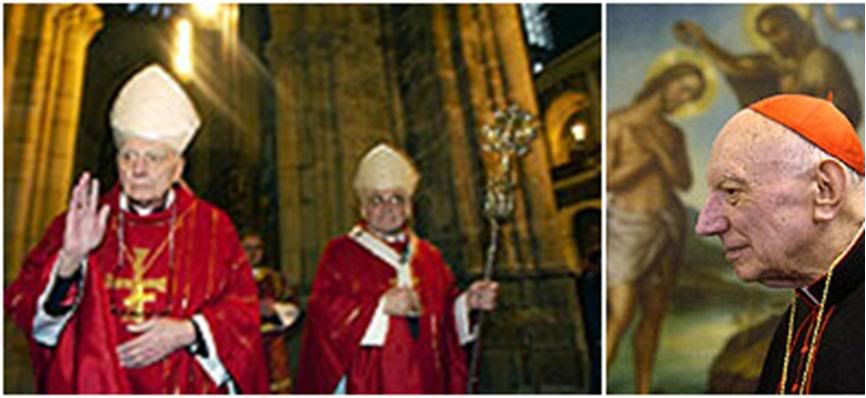 Left photo, the two Czech cardinals Spidlik and Vlk (Archbishop of Prague); right photo, Cardinal Spidlik.
Left photo, the two Czech cardinals Spidlik and Vlk (Archbishop of Prague); right photo, Cardinal Spidlik.
Helen Destombes spoke to Cardinal Spidlik about the Pope's trip:
CARDINAL SPIDLIK:
John Paul II came here 20 years ago, after the Berlin Wall fell, and later wehen Communism itself collapsed and the new Europe was born. He said then that the purpose of his visits was to work for the spiritual unity of Europe.
Benedict SVI comes here 20 years later, to Prague, which is the geographical center of Europe. and so it makes us reflect once more: we need to build a Europe that is spiritually united.
The Pope's visit is not political but spriitual. The Czechs are a people of Oriental origin who have lived the past 2000 years in a wEstern civilization and culture. We can conciliate these two mentalities so that Europe - which for so long was divided in two - can become one Europe again.
Here's a 2004 report from Prague Radio about Cardinal Sidlik shortly after he got the red hat.
The second Czech cardinal

The Czech Republic has had two Catholic cardinals since the ordination of Tomas Spidlik in 2003. This week, Cardinal Spidlik was in the Czech Republic for the first time since then.
Ironically, his visit coincided with a spat between the Czech state and the Vatican after President Vaclav Klaus had rejected a draft treaty between Prague and the Holy See.
[NB: The treaty is still pending give years later.] Despite this, Cardinal Spidlik is philosophical about his homeland's relations with the Catholic Church:
"I explained it to our President with a very simple comparison - when two young people get married, I tell them they love one another but that this will pass. I then tell them that they will have difficulties, which will pass also, but that they should never stop speaking to one another. When people keep talking to one another then the issue will be resolved."
Cardinal Spidlik is well known in the Czech Republic from his days as a broadcaster for Vatican Radio during the communist era. He is also a renowned scholar of Eastern spirituality. One of the reasons for his visit was to give a lecture on spirituality in the European Union. This is something Cardinal Spidlik feels is lacking despite closer economic integration:
"Europe is unifying economically and politically, but we have not achieved the spiritual unity of Europe. And that is something that we can anticipate, because in 2000 years we have amassed many beautiful things."
Cardinal Spidlik believes that Europe should focus on the ethical ideals that contributed to the continent's development so that it can establish common spiritual values. It could then present these to the rest of the world and use them as a bridge between the East and West.
Despite his own deep religious convictions, Cardinal Spidlik comes from one of the most secular countries in Europe. Although statistics show that a majority of Czechs claim to be atheist, Cardinal Spidlik doubts whether this actually proves that Czechs have really turned their backs on their Christian heritage and embraced modern rationalist values:
"Statistically, it is very relative. For instance, Czechs don't like to say that they are religious, but what they feel in their hearts is another issue. The Czechs are in the centre of Europe. They have always had western German civilization, but their origins are in the east. I always say that they have the German head and the Slavic heart. And when these are not sufficiently in harmony with each other, the consequences are catastrophic. We must find harmony and not be in conflict."
And what about the other Czech cardinal? Hre's a news item from CTK last February - weeks after it was known the Pope would be visiting the Czech Republic.
Czech Cardinal Vlk joins criticism
of Pope over Holocaust denier

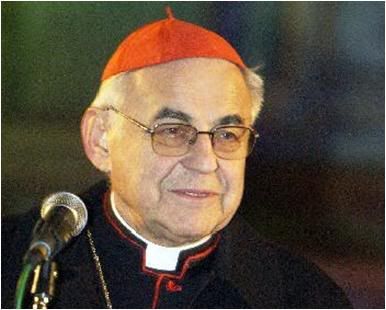
Prague, Feb. 2 (CTK) - Czech Cardinal Miloslav Vlk has joined the critics of Pope Benedict XVI's decision to lift the excommunication of a Holocaust denier, British bishop Richard Williamson, Vlk has written on his website, daily Lidove noviny (LN) reported.
Prague Archbishop Vlk, primate of the Czech Catholic Church, wrote that Vatican had made an impression of having played down the step.
Vlk recalled that at the beginning he defended the Pope's "gesture of mercy" lifting the excommunication of four schismatic bishops, and tried to stand up against the wave of criticism it had stirred up.
Cardinal Walter Kasper, who is responsible for relations between the Vatican and the Jews, admitted that the Pope had not consulted his step with him, Vlk wrote.
"No one has apparently taken Bishop Williamson's opinions into considerations during this act," Vlk added.
"As a Catholic bishop I definitely condemn any anti-Semitism as it is incongruous with the Catholic Church's doctrine," Vlk wrote.
[But Williamson's anti-Semitism had nothing to do with why he was excommunicated! The Pope lifted the excommunication - that doesn't mean he condones everything that each of the four bishops stands for or does, if they do wrong!
In this case, it did not mean - even if the Pope knew about Williamson's negationism beforehand - that he was condoning it by lifting the excommunication. Why is it difficult for anyone with common sense to see that?
Lifting the excom from the four bishops was a class action, arising from the fact that all four were illegally ordained together on the same occasion. If in the meantime, one of them had been found to advocate apartheid or slavery, he cannot be exempted from the class action exercised by the Pope because objectionable socio-political views have nothing to do with why he was excommunicated to begin with. ]
LN writes that Czech theologist Odilo Stampach is of the view that the stance of Vlk and other Church dignitaries is very surprising, as the Roman Catholic Church is traditionally considered a strictly hierarchical structure with the Pope on the top having everything in control.
Stampach said the resistence towards the Vatican was a positive signal, proving that the Church is opposing the "retreat from the reform course,"
Lidove noviny writes .
[Tsk-tsk! Cardinal Spidlik's reference to the Czech's 'German education' is showing itself in the liberal Lehmann/Zollitsch-like reasoning of Stempach.]
The Vatican decided to lift the 20-year-long excommunications of four traditionalist bishops on January 14. The most controversial of them is Williamson who in an interview denied the existence of gas chambers and the extent of the Holocaust. This is why his rehabilitation leashed stormy criticism.
The Pope condemned Williamson's words and expressed solidarity with the Jews at a general audience on January 28.
I wonder if Cardinal Vlk - and any of the other dissident bishops for that matter - ever wrote the Pope after the March 10 letter to all the bishops, to at least acknowledge they got the letter even if they could not bring themselves to apologize for their distinct and deliberate lack of communion with the Successor of Peter.
BTW, The newsphoto agencies had these measly two photos today (two because there are two of each kind) to illustrate 'preparations' in Prague for teh Pope's visit. Looks to me like just a couple of picutres taken at the Church of Our Lady of Victory, home to the miraculous image of the Infant Jesus:
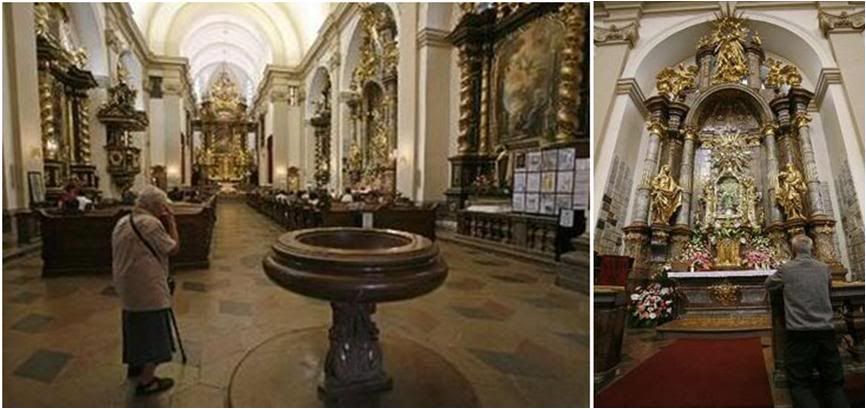
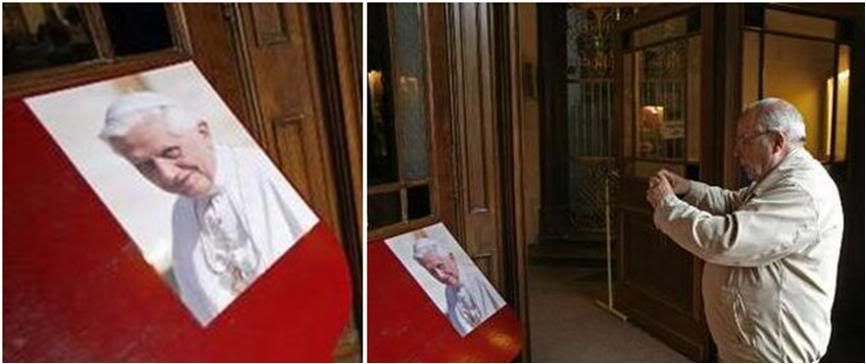 Why do they never take pictures of the posters and streamers that are usually in abundance for a papal visit? Even during the visit itself, they somehow manage to avoid taking pictures of these objects that most characterize a papal visit - in a way that hardly ever happens for anyone else, not even by a President of the United States!
Why do they never take pictures of the posters and streamers that are usually in abundance for a papal visit? Even during the visit itself, they somehow manage to avoid taking pictures of these objects that most characterize a papal visit - in a way that hardly ever happens for anyone else, not even by a President of the United States!
[Modificato da TERESA BENEDETTA 25/09/2009 14:01]